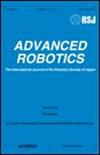细心倾听机器人对精神科日托儿童愉悦和觉醒变化的影响
IF 2
4区 计算机科学
Q4 ROBOTICS
引用次数: 0
摘要
摘要:在本文中,我们研究了专注倾听机器人在精神科日托中的实用性,这是一种用于精神障碍康复的门诊治疗项目。该机器人是基于咨询技术开发的,比如重复用户说过的话。它还可以在用户说话时产生反向通道作为一种倾听行为。已经进行了对话实验,以评估机器人是否可以在这种情况下提供有效的活动。机器人专心地听18名日托中心的参与者谈论他们最近难忘的事件,时间长达3分钟。结果表明,谈话增加了自我评价的觉醒。对机器人的印象表明,与机器人交谈比与陌生人交谈更健谈,作为交谈伙伴比作为朋友更有用。受试者对是否会把机器人放在家里也有积极的印象。线性回归分析表明,机器人的评估反应和反向通道的频率对愉悦感的改善有积极的影响。这一发现可能为使用这种机器人铺平道路,人们可以毫不犹豫或过度考虑地轻松交谈。关键词:交流机器人专注倾听心理健康精神科日间护理言语分析感谢Yosuke Maeda博士和Sawa Maeda女士对实验的指导。我们还要感谢Yumi Onishi女士、Reina女士Ōki和Hiroshi Notsu先生对他们的实验的支持,以及基于他们在精神科日托方面的知识和经验所进行的富有洞察力的讨论。披露声明作者未报告潜在的利益冲突。本研究由JSPS KAKENHI (19H05691)和JST Moonshot研发资助号JPMJMS2011支持。keiko Ochi毕业于日本东京大学信息科学与技术研究生院,获博士学位。目前,她的研究兴趣包括辅助技术和语音信号处理。Koji Inoue于2015年和2018年在日本京都大学获得信息学硕士和博士学位。他现任京都大学信息学研究生院助理教授,2015年至2018年担任日本科学促进会(JSPS)研究员。他的研究兴趣包括语音对话系统、语音信号处理、多模态交互和会话机器人。他是IEEE和ACM的成员。Divesh lala2015年毕业于日本京都大学信息学研究生院,获博士学位。目前,他是京都大学信息学研究生院的研究员。主要研究方向为人机交互和多模态信号处理。河原达也1987年获日本京都大学信息科学学士学位,1989年获工学硕士学位,1995年获博士学位。1995年至1996年在美国新泽西州默里希尔贝尔实验室做访问研究员。现任京都大学信息学院教授。从2020年到2023年,他担任学院院长。在此之前,他也是ATR和NICT的特邀研究员。他在自动语音识别、口语处理和口语对话系统方面发表了450多篇学术论文。他一直在进行几个项目,包括开源语音识别软件Julius,日本国会(Diet)部署的自动转录系统,以及自主机器人ERICA。Kawahara博士是APSIPA的主席,ISCA的秘书长,IEEE的会员。Hirokazu Kumazaki于2015年获得日本庆应义塾大学医学学位。他目前是长崎大学医学院的教授。他的研究兴趣包括精神病学、发育障碍、人工智能、感觉症状和通信机器人。他是INSAR的成员。本文章由计算机程序翻译,如有差异,请以英文原文为准。
Effect of attentive listening robot on pleasure and arousal change in psychiatric daycare
AbstractIn this paper, we investigate the usefulness of an attentive-listening robot in psychiatric daycare, an outpatient treatment program for the rehabilitation of psychiatric disorders. The robot was developed based on counseling techniques, such as repeating words that the user has said. It can also generate backchannels as a listening behavior during user utterance. Conversation experiments have been conducted to evaluate whether the robot can provide effective activities in this setting. The robot attentively listened to 18 daycare attendees talking about their recent memorable events for up to 3 min. The results showed that the conversation increased self-rated arousal. The impressions of the robot showed that talking with the robot was more conversable than with strangers and more useful as a talking partner than a friend. The subjects also had a positive impression about whether they would keep the robot in their homes. A linear regression analysis indicates that the frequency of the robot's assessment responses and backchannels positively affect pleasure improvement. The findings may pave the way for utilizing this kind of robots that people can talk to easily without hesitation or excessive consideration.Keywords: Communicative robotattentive listeningmental healthpsychiatric daycarespeech analysis AcknowledgmentsWe thank Dr. Yosuke Maeda and Ms. Sawa Maeda for their supervision of the experiments. We also thank Ms. Yumi Onishi, Ms. Reina Ōki and Mr. Hiroshi Notsu for the support to their experiments and insightful discussions based on their knowledge and experience in psychiatric daycare.Disclosure statementNo potential conflict of interest was reported by the author(s).Additional informationFundingThis study was supported by JSPS KAKENHI (19H05691) and JST Moonshot R&D Grant Number JPMJMS2011.Notes on contributorsKeiko OchiKeiko Ochi received PhD in Graduate School of Information Science and Technology, University of Tokyo, Japan. Currently, her research interests include assistive technology and speech signal processing.Koji InoueKoji Inoue received his MS and PhD degrees in informatics in 2015 and 2018 from Kyoto University, Japan. He is currently an assistant professor at Graduate School of Informatics, Kyoto University, and was a research fellow of the Japan Society for the Promotion of Science (JSPS) from 2015 to 2018. His research interests include spoken dialogue systems, speech signal processing, multimodal interaction, and conversational robots. He is a member of IEEE and ACM.Divesh LalaDivesh Lala received PhD in Graduate School of Informatics in 2015, from Kyoto University, Kyoto, Japan. Currently, he is a researcher in Graduate School of Informatics, Kyoto University. His research interests include human–robot interaction and multimodal signal processing.Tatsuya KawaharaTatsuya Kawahara received BE in 1987, ME in 1989, and PhD in 1995, all in information science, from Kyoto University, Kyoto, Japan. From 1995 to 1996, he was a visiting researcher at Bell Laboratories, Murray Hill, NJ, USA. Currently, he is a professor of School of Informatics, Kyoto University. From 2020 to 2023, he was Dean of the School. Before that, he was also an invited researcher at ATR and NICT. He has published more than 450 academic papers on automatic speech recognition, spoken language processing, and spoken dialogue systems. He has been conducting several projects including open-source speech recognition software Julius, the automatic transcription system deployed in the Japanese Parliament (Diet), and the autonomous android ERICA. Dr. Kawahara is President of APSIPA, Secretary General of ISCA, and Fellow of IEEE.Hirokazu KumazakiHirokazu Kumazaki received his degrees in medicine in 2015 from Keio University, Japan. He is currently a professor in Nagasaki University, School of Medicine. His research interests include psychiatry, developmental disorders, AI, sensory symptoms, and communication robots. He is a member of INSAR.
求助全文
通过发布文献求助,成功后即可免费获取论文全文。
去求助
来源期刊

Advanced Robotics
工程技术-机器人学
CiteScore
4.10
自引率
20.00%
发文量
102
审稿时长
5.3 months
期刊介绍:
Advanced Robotics (AR) is the international journal of the Robotics Society of Japan and has a history of more than twenty years. It is an interdisciplinary journal which integrates publication of all aspects of research on robotics science and technology. Advanced Robotics publishes original research papers and survey papers from all over the world. Issues contain papers on analysis, theory, design, development, implementation and use of robots and robot technology. The journal covers both fundamental robotics and robotics related to applied fields such as service robotics, field robotics, medical robotics, rescue robotics, space robotics, underwater robotics, agriculture robotics, industrial robotics, and robots in emerging fields. It also covers aspects of social and managerial analysis and policy regarding robots.
Advanced Robotics (AR) is an international, ranked, peer-reviewed journal which publishes original research contributions to scientific knowledge.
All manuscript submissions are subject to initial appraisal by the Editor, and, if found suitable for further consideration, to peer review by independent, anonymous expert referees.
 求助内容:
求助内容: 应助结果提醒方式:
应助结果提醒方式:


